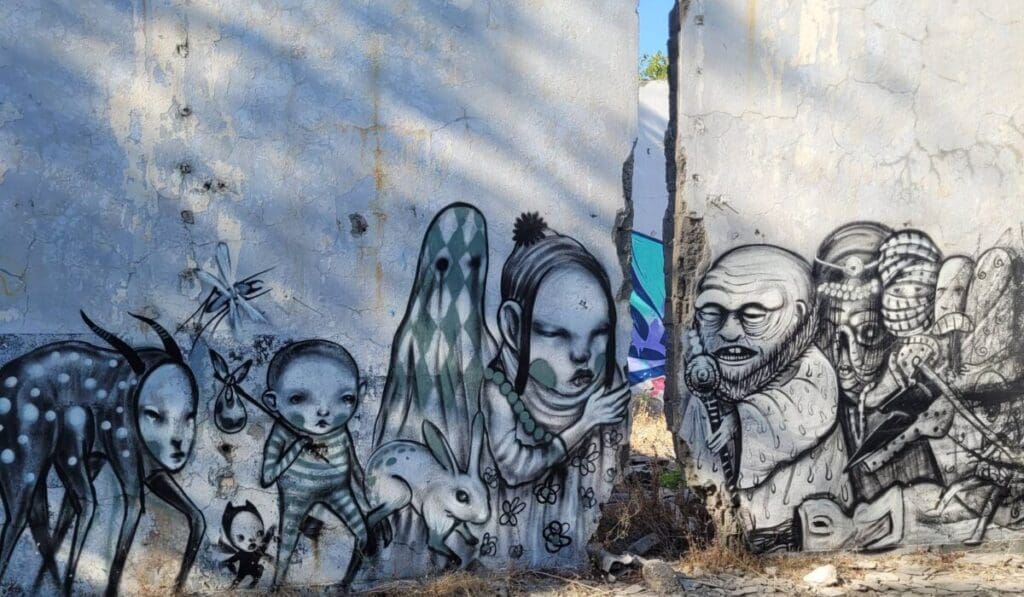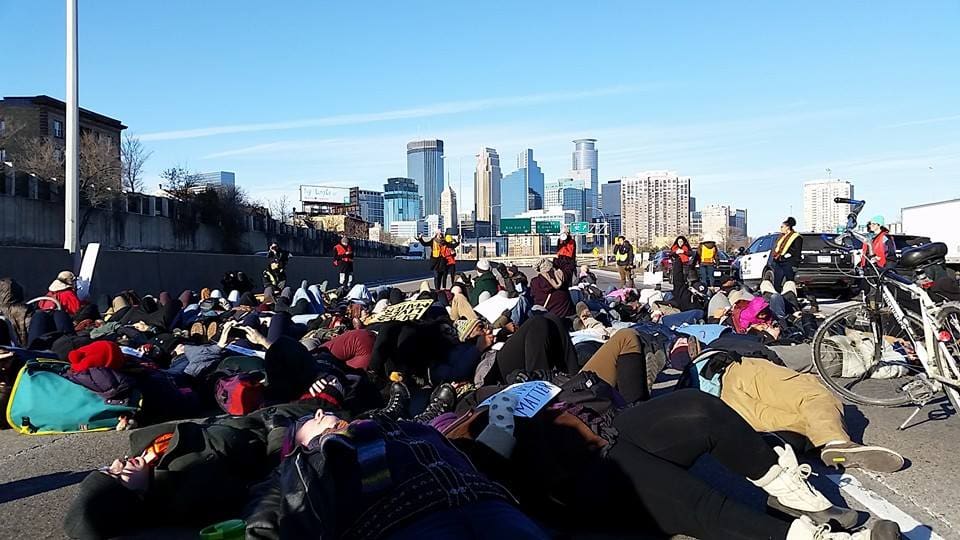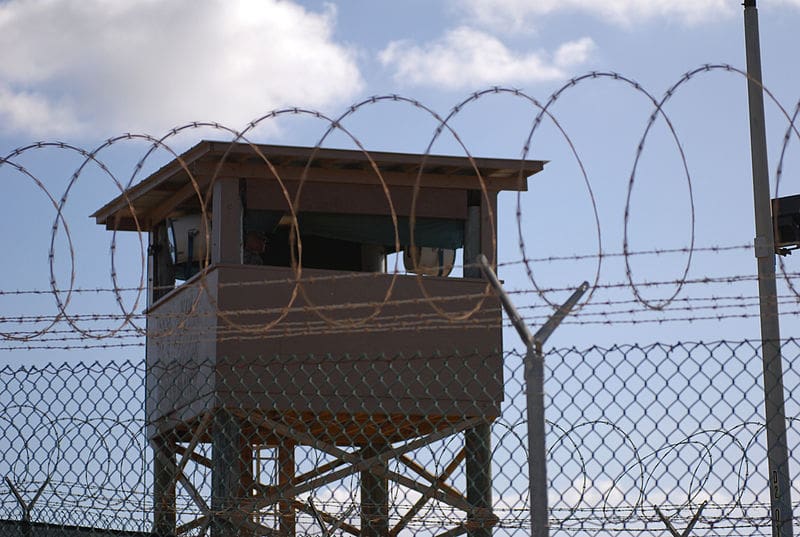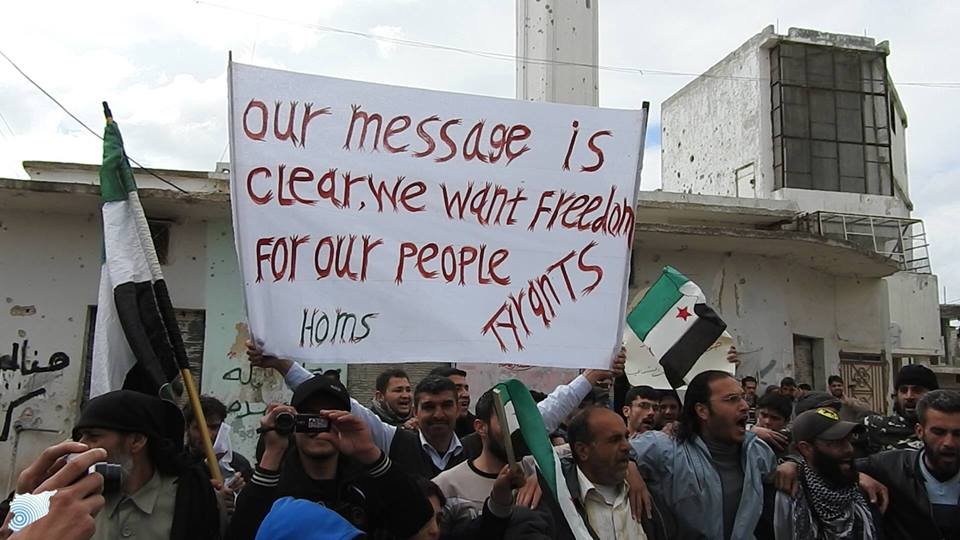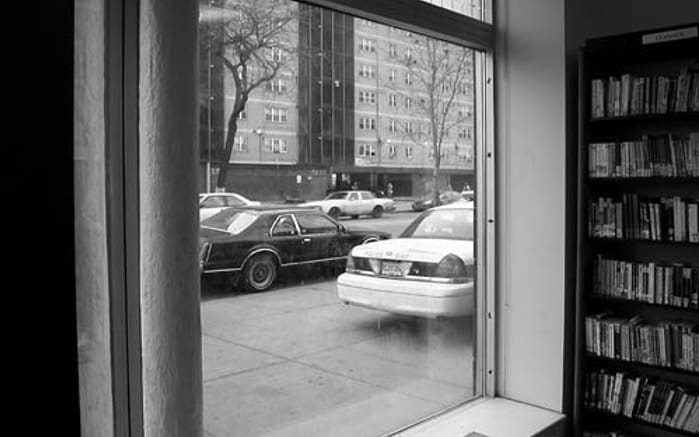AntiNote: From the Periphery Media Collective has launched a new podcast to keep listeners up to date on current events often sidelined or erased by mainstream media narratives. The first episode of the From the Periphery Podcast, hosted by Antidote Zine’s very own Aydın Yıldız, centered a discussion of recent widespread protests in Turkey. This outburst followed the arrest of Ekrem İmamoğlu, Istanbul’s revered mayor and opposition party candidate, widely seen as a strong contender to challenge Erdoğan’s decades-long reign as Turkey’s head of state.
At the bottom of this post is an episode summary in the form of graphic notes, illustrated by @Lizartistry titled “What’s Happening in Turkey?”
Transcribed from the 30 March 2025 episode of the From the Periphery Podcast and printed with permission. Edited for space and readability. Listen to the whole episode:
Day by day, if we cannot find a different way to express ourselves in the protests, many different kinds of groups will stop going to protest. It will be a chauvinist show and it would be good for the government.
Aydın Yıldız: Hi folks. Welcome to our first episode of the From the Periphery podcast. We’re here today with a couple guests calling in from Turkey to talk about the protests that have been happening over the past week and a half, political context for why that’s been happening, and to get more on-the-ground stories about what’s actually going on in the streets. As we’ve seen, media coverage has been limited.
Could you two introduce yourselves? We’ll start with Efe and then go to Kadir.
Efe Levent: I’m Efe Levent and I’m the founder of the media collective called Mangal Media. We’ve been active since 2016, focusing on artists and writers from the periphery. I’m a writer myself, both essays and fiction. I’ve been following the protests since they’ve first been going on and I’ve been active in previous waves of protest in Turkey as well.
Kadir Ersoy: I’m Kadir Ersoy, a.k.a. M?. I’m a street artist, that’s why I’m on the streets as a lifestyle. Since the beginning of my teenage time, I’ve been on the streets for protests and to understand the culture of the streets and being against the system. That’s why today I’m going to protests to understand what’s going on and why people are on the streets.
AY: Thanks for joining us, both of you. I’d love if you could give us an overview of what’s been happening in the past week and a half. Any stories you want to mention about how conditions have been on the streets, what’s been happening with the protests from a more on-the-ground perspective? We’ve seen some media coverage in international media, but we’d love to hear from you all how things have been feeling, why people are protesting, any context you want to give.
KE: Last week they arrested the mayor of Istanbul and these protests started because of that action. But the real reason is not just the mayor of Istanbul, Ekrem İmamoğlu. Ekrem İmamoğlu is just one of the reasons for the protest. The opposite party, CHP, (dʒeːheːpeˑ in Turkish), this party used this person; he’s the mayor of Istanbul and one of the alternative options for the next presidential elections. The government wants to clear their way and they want to take him to jail because of some reasons, but the reasons are not clear and the people know that the real reason is the corruption of Turkey.
Young people, when I talk with them in the streets, say, We are so worried about our future. We don’t know what we’re going to do. And many people tried to escape from Turkey because of that. Now it’s turning into a total terror regime, and the people don’t want to live under a total terror regime. Especially young people prefer to fight against the government and are going to the protests to take their rights back, and that’s what these protests are mainly about. But İmamoğlu’s arrest was a kind of spark and reason to create that energy on the streets. For me, I understood it like that.
EL: I think there’s a variety of reasons why people are out there as well. Ostensibly it is the arrest of İmamoğlu. He was pressed with two charges. One of them was corruption and embezzlement and the other one was a terrorism charge. And one of the things that’s kind of weird about this is that after he was arrested, there was news that the terrorism charges had dropped, but the official announcement from the Minister of Justice was something like, Oh, we got the embezzlement charges anyway so we don’t need the terrorism charges.
It’s precisely the sort of thing that people are fed up with. Not just the fact that these charges are trumped up and unconvincing, but also the fact that they can be pushed through and withdrawn at the will of the government and at their own convenience. It’s what’s making life so unpredictable and anxious in this country right now.
There are also some very unsavory reasons why people are protesting that need to be kept in mind—the peace process that was started with the PKK a couple of months ago. There’s a lot of groups that are out protesting. Now not all of them are as organized as most mass movements in the twenty-first century have been. People are not drawn out by the political parties and organizations. There’s been quite a number of people who are purely out there to protest against the peace process that’s been going on [with the PKK]. It’s something that I’m really nervous about but I’m also hesitant about demoralizing other people from joining the protests by creating the impression that that is what the protests are about. But it’s also something that needs to be remembered and counteracted on the ground.
AY: I was going to ask another question about the more specific dynamics within protest movements currently, especially because CHP, the opposition party, seems to have been calling a lot of these protests or coming in with a lot of messaging around encouraging people to be in the streets. And then there’s a lot happening amongst students and then this other dynamic that you just named, Efe, [around the peace process].
I’m wondering if you could give us more information about what the dynamics are between those different groups of people, their interests, how they’re negotiating being in the same space together. Are they in the same space together? What does that look like for you all? Are there certain demands that are being brought forward more than others? How has that been going?
KE: The CHP tried to show these protests as for İmamoğlu; they tried to dominate in this way. Their protests are about their supporters and they say,Yes, this is for democracy and they arrested our mayor of Istanbul, our politician, and we need your help. Come to help us. But the students say, Yes, İmamoğlu is the reason. But just one reason. We are here for our freedoms. We are here for our rights. And they are always at the protests. They try to stop some politicians’ voices to talk about their rights. It looks like they’re together, but it’s separate in the mindsets and perspectives they’re bringing.
Also because students lost so many things in their lives. They lost their freedom. They lost their opportunities at a young age. And they cannot live as young people. They cannot live as students because they cannot go to gigs. They cannot go to cafes or learn something else because, the first problem is the economy—these students don’t have any money and they cannot live in normal conditions. CHP tried to show these protests are for İmamoğlu and people are fighting for İmamoğlu but students say, no, we are fighting for our rights. Now, the population of Turkey is trying to focus on students more.
EL: I think there’s also a very broad coalition that’s not always co-existing very harmoniously all the time. One of the big issues that’s been going on for a very long time is Turkey pulling out of the Istanbul Convention, for example, on the grounds that it’s acknowledging LGBTQI identities as legitimate identities. By pulling out of the Istanbul Convention, Turkey has also neglected the pursuing of cases of violent crimes against women. So for a long time the feminist movement has been out on the streets protesting against pulling out of that convention and trying to bring Turkey back into that convention. The feminist movement and the queer movement are very active in these protests.
In terms of the other elements, economic problems is a huge thing. For a long time Turkey has been struggling with a devaluating currency. They’ve been implementing these difficult-to-understand economic policies for a very long time of keeping the interest rates low so that people would keep spending and investing, trying to keep the economy growing. But that eventually led to even more devaluation of the currency. Now we’re struggling with tremendous inflation. There’s a lot of people who are out there because of this. But then again I think Kadir would be able to testify to this tension a lot better than I would because he was actually on the frontlines.
I’ve been watching live coverage and following the discourse on it for a long time. The extreme nationalist elements that are out there are making it very difficult for people like the queer resistance movement or the Kurdish movement who are there to protest openly and by doing so reveal their identities. It’s not just making it very difficult, it’s making it dangerous for them also.
KE: As Efe said, there are neo-Turkish idea groups that are elements inside of the protests also. In the protests, sometimes they may make trouble with the other elements, like Kurdish, LGTBQ, and feminist groups. They are so young, like eighteen years old, seventeen years old, some of them are fifteen, sixteen years old. They are using Discord and Telegram channels to connect. Their ideas are mostly neo-nationalist ideas. Actually, they don’t know what they are saying. They don’t know what they are thinking. They think this is true because we follow Mustafa Kemal Atatürk. They say it like that: We follow Mustafa Kemal Atatürk (He was a nationalist) and we follow his way. That’s why yes, this country is a Turkish country and Turkish elements are the most important element in this country.
In the last days, the government has been making some kind of connection with the Kurdish party and the Kurdish groups, that’s why they are so aggressive about this subject. You can see many signs with writing on it—Fuck you, PKK. Fuck you, Apo. Fuck you, Kurdish nationalist, like that. You can imagine many things. They did some actions. They are burning some symbolic Apo statues and these kinds of things.
It’s the first time I have ever seen on the streets those kinds of elements doing that kind of thing. Yes, there were so many nationalists and Turkey has always had right-wing groups. But this time it’s so open, like a different way of the neo-Turkish ideas.
EL: As far as my own emotional state, I see the police brutality and I’m like, Oh my gosh, something needs to be done about this. And then I see these extreme nationalist elements. This summer has kind of been their summer.
This is something that people don’t talk much about in Turkey for some reason, but in July there had been an outright massacre in Kayseri. A Syrian man was accused of sexually harassing a young Syrian girl and the Turkish populous of Kayseri decided to lynch this person. They went all over Kayseri ransacking shops, kicking people off from their motorcycles, beating them up, and lynching them.
The leader of the party who is inciting this movement, he has been in prison for about a month or two. The charges against him are also trumped up. The big problem here is that there’s a lot to charge him with, but he’s charged with things like insulting the president. The way that it’s being done is hasty and unconvincing. He’s in prison now and the CHP have been reading the letter that he wrote from prison on top of the campaign bus on the first or second day of the protest.
We need to be able to stand in solidarity no matter what against the current government and the police brutality that we’re seeing, but it’s really pushing the limits. There is definitely an element within CHP who is exactly on this line. There is, for example, the mayor of Bolu who has declared that he is going to cut off drinking water from Syrians who are living in Bolu. There were multiple discussions of evicting him from the party but because he keeps winning the mayoral elections, every time he gets in, they abandon that [discussion].
There is an element like this within the CHP as well, within the party of İmamoğlu and Özgür Özel, who are organizing the protests. But at this moment, since I feel like there is so much worse within the opposition than İmamoğlu and Özgür Özel, who are these tepid figures—these milquetoast and middle-of-the-road liberal types —I will defend them to death right now because the alternative is terrifying. One alternative is that nothing is going to happen, nothing is going to change, AKP’s going to stay in power, which is a disastrous scenario. The second alternative is someone like Muharrem İnce is going to become president and we’re going to have an entirely new chapter of fascism unfold in this country.
AY: There’s a lot of historical context to how we go to this moment. I’m curious how much conversation there is, if there is conversation, around protestors currently and especially the students and people who are not just coming out in support of other kinds of government agents? If there’s conversation amongst people on the streets that at all mirrors or draws from, for example, the Gezi Park protests, previous iterations of these kinds of big uprising social movement moments, what people are talking about?
Are they talking about any kind of demands or trying to build something different? Or if we’re still in the heat of the moment, people upset and out in the streets—do you all have a sense of where things are headed? Or are we still kind of watching things unfold and meeting this moment?
KE: Gezi is a very obvious comparison that people make, but it’s important to keep in mind the fifteenth of July coup attempt—there’s a lot of similarities between people’s reactions. As far as the situation right now between the protestors and police, what reminds me of the coup attempt is that there is an almost embracing of police within certain elements of the protestors.
There’s the aqueduct that leads up to the Saraçhane building, the mayoral building, where most of the protests are happening—there’s the aqueduct and the big road that leads from underneath it; that’s where a lot of the fighting between the protestors and the police was happening. I’ve seen live broadcasts from that place with the protestors. I’ve never heard, except maybe on the fifteenth of July, protestors shouting the slogan, May the hands that are raised against the police be broken.
I’ve not heard this slogan chanted by protestors while they’re confronting the police. That slogan is usually chanted by people who are on the other side of the police line and who are against the protest. It was the first time in my life I’ve seen something like that and from that alone, it brings an important comparison with the fifteenth of July response to the coup because there is a sentiment that the police are “our police.” It’s a delusion that some of the protestors suffer from. If it’s not delusional, that’s even worse if they’re on the same side.
AY: To be clear for listeners, this is the fifteenth of July of 2016 when there was a military coup attempt that was one of many turning points in contemporary Turkish politics.
You were talking about this pro-cop sentiment amongst protestors currently and it feeling a lot more like how people were out in the streets in support of the government in July of 2016. We’re hearing about over a thousand people having been arrested in the past nine days. I’m curious if you all could speak to who is being arrested, why, and where is the repression happening?
I think there might be some confusion around: if these people are supportive of the police or other government forces, why are they being thrown in jail? Is this moment just an excuse to arrest dissidents of various kinds? Also, I’m curious: you all mentioned anarchists, feminists, queer folks. Where are those folks in the scheme of people being out on the streets? Are they being vocal? Are they visible? Are they being respected at all? Or are they not quite so in the forefront as they might have been in other protest movements?
KE: Yeah, I got shot in the head with a rubber bullet. They are arresting people to make them terrified about the system because they are so young they don’t know what’s going on. Also they arrested many left wing political groups. They arrested them in their houses in the morning. Nowadays we started to talk with the groups about how we can be in the protests with different ideas because many feminists, queer groups, LGBTQ groups say We feel unsafe. Because of that, some of them don’t want to go to protest. Sometimes that may have problems with these kinds of people.
There is this symbol they use. It’s a Turkish symbol historically, but now MHP, a political party, has become a partner of AKP, and these two parties have used this symbol since 1991. They brought it to Turkey from Azerbaijan. It could be a Turkish symbol but it’s an ethnic Turkish symbol. Turkey is a state, the nation of Turks. Turkey has many other ethnicities and when they use this symbol, other ethnicities, leftwing, and the other groups feel unsafe around them.
These guys don’t know what they do. I tried to explain, Look, yes, it could be a Turkish symbol in the world but in Turkey it’s a political symbol. When you use this symbol it mean’s you’re a supporter of MHP and you have to understand that. Or, if you want to change this, you have to clear the history first because many people killed by some counter-guerilla groups, some mafia groups, some partners of the government but they are criminal people, and use this symbol. So the different groups, the different voices, don’t feel so safe.
They feel unsafe around them. And day by day, if we cannot find a different way to express our selves in the protest, probably, many different kinds of groups will stop going to protest. It will be a chauvinist show and it would be good for the government.
AY: Another question that I had was seeing the repression of journalists. There’s been a number of reports of the journalists being arrested that’s reaching international media. I’m curious how are people doing that kind of journalism and reporting about what’s happening?
EL: Now that we’re talking about the international aspect of how this news has spread around, one of the things that concerns me is the extreme fatalism of international reporting on the issue. I have seen some international news reports in English where the title is something like Democracy is Over in Turkey, Tomorrow Totalitarian Starts. They don’t even make any reference to the fact that there’s a protest, barely any reference to it at all. That’s what’s been getting on my nerves a lot.
It’s old-fashioned US-centrism as well. A lot of them lead up to saying, The Trump government didn’t say anything about it so there’s nothing that can be done about it, as if people who actually are living here have zero power or agency or responsibility over what could be done, like the entire faith of the world, our rights, our democracy, the way we settle our conflicts, are entirely dependent on Donald Trump and what he has to say.
It’s an important factor. It’s undeniable. But when the international press is only looking at it from a fatalistic perspective, and the reason for that fatalistic perspective is the lack of US involvement, as if we have never witnessed the presence of US involvement and the way it brings “democracy” to the rest of the world, as if we’ve not seen that unfold over the past five decades. That’s been getting on my nerves a lot.
More on the journalistic side also, for a long time arresting photojournalists was not very common practice in Turkey. They would arrest journalists, they would have night raids into their houses and things like that. I’ve seen them get shot recently. They would get shot. Arresting photojournalists, that’s really concerning too. To my knowledge, it had not happened during the Gezi Protest, for example. That’s a different level of alarm that’s going on there as well.
AY: Are there other places you all would recommend for us to follow what’s been happening on the ground? Are there sources we can be looking at for more accurate reporting on what’s been happening there?
EL: As for English language, I don’t know. When people usually ask me for things to follow, like what’s up in Syria, I usually recommend Fire These Times. In English language, I haven’t got a clue where you’d follow closely. Sources like AL-Monitor are okay.
KE: DW Turkish maybe you can find in English. But there’s little more. Most of them are main party groups making English content.
EL: There is the Aposto English. That’s an okay one.
AY: Are there places that folks can follow you all? Are there any social media or organizations or websites?
EL: There’s Mangal Media, the site that we founded. In 2016, we were already working on founding it, and we had created this manifesto to launch it and then once the coup attempt happened we just launched it. It’s a platform that I have founded with a lot of former revolutionaries who immigrated to Turkey from Syria and Egypt, and later Lebanon; we have some friends from Afghanistan, Iran, and Pakistan—that kind of “global south” which has become a terminology that I’m not entirely comfortable with anymore. But I guess, we are from the periphery. We try to take an angle that’s going to include the fact that there are migrants living here. The fact that the Arab Spring was not just a civil war but a revolution. All these angles are missing in a lot of the leftist contexts that are not just in Turkey but globally. So we founded it as a challenge to ordinary liberal, progressive, or hardline leftist perspectives that are dominating the media space. So if you want to follow us, Mangal Media is our name.
KE: I just use my Instagram to share my arts and what I see on the streets. Recently I haven’t focused on art as much, more on protest. But I have an Instagram page to share my art. I make fun zines to share my ideas and show what I’m thinking about the world.
AY: Awesome. Hopefully we’ll be able to do more updates on how things are going in Turkey as the situation develops. I really appreciate you all coming on and giving us the rundown. I know this stuff is extremely complex even for us as people who are paying attention to all for this, but especially for people who don’t know. So thank you for giving all of this context and being generous with your time and energy here. We appreciate it.
EL: So long.
KE: Thanks for everything.
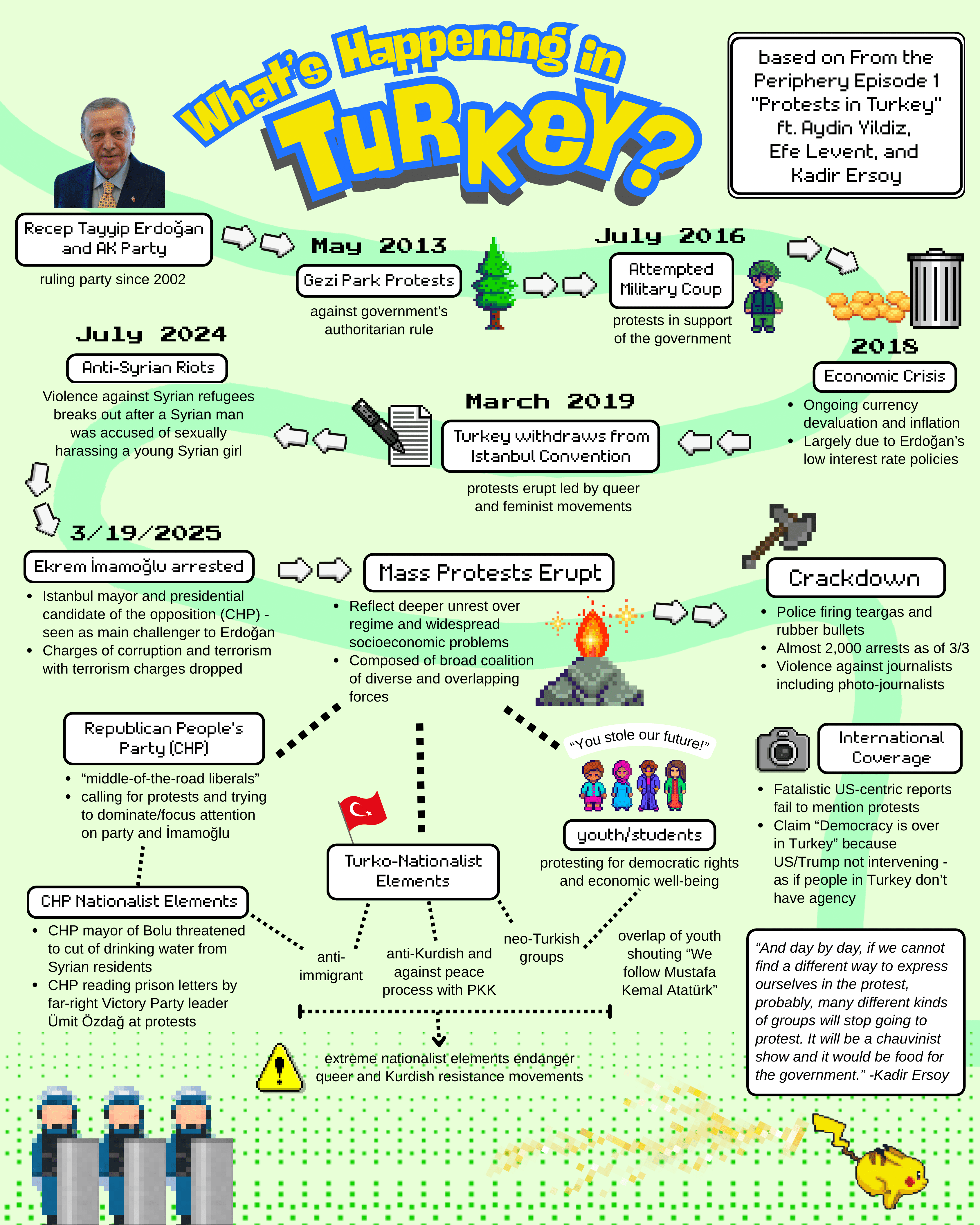
Graphic notes, illustrated by @Lizartistry titled “What’s Happening in Turkey?” with text and illustrations referencing the episode of the same title from the podcast “From the Periphery Podcast” with Aydın Yıldız, featuring guests Efe Levent and Kadir Ersoy.
Featured image: Mural art by guest Kadir Ersoy, also known as M? and collaborator @elsiethecowww

